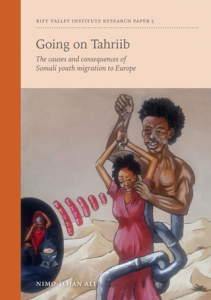‘An enlightening exposé of the motives and societal pressures that spur irregular migration, in this particular case, from Somaliland and Puntland. This study could not be timelier given that people smugglers and migrant traffickers have proven themselves to be extremely adept at continuously adjusting their methods to changed and changing policy contexts. Policymakers in both countries of origin and destination would be well-advised to consider the complexities that inform decisions to emigrate using illegal channels if effective solutions to deter this dangerous form of migration are to be found.’
MAUREEN ACHIENG, IOM
More than one million people arrived in Europe via the Mediterranean in 2015. In Somaliland and Puntland, accounts of young people embarking on the hazardous journey via Ethiopia, Sudan and Libya, are widespread. In current parlance, these young people are said to be ‘going on tahriib’. Unlike previous migrations, tahriib is unique in that it is largely a youth phenomenon. The young who make the decision to go are usually facilitated by human smugglers who offer deferred payment schemes to encourage migrants to leave. The journey is perilous. Being held for ransom, abuse and death in the desert and at sea are commonplace. Going on Tahriib is based on interviews with households in Somaliland and Puntland as well as young people and government officials. The report examines the causes and consequences of tahriib, why young people decide to go on tahriib, and the often serious effects on the families left behind. It is crucial to understand this phenomenon and the motivations of those who attempt this journey as uninformed policies may push even more young people to attempt the precarious journey.




